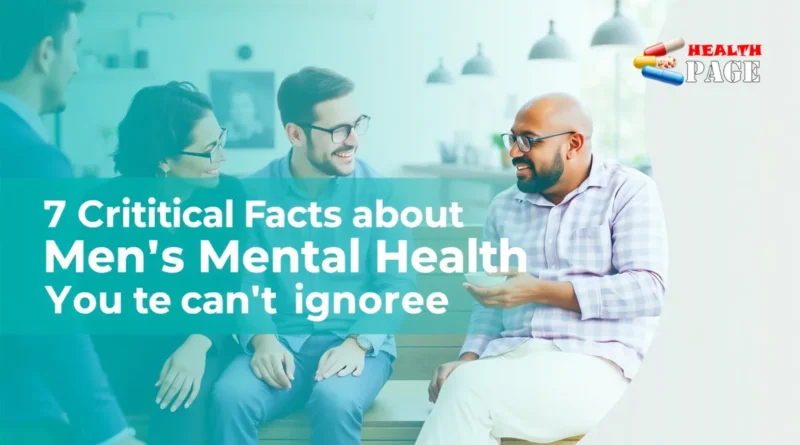7 Critical Facts About Men’s Mental Health Month You Can’t Ignore
If you’ve ever felt like you had to “tough it out” when things got heavy, you’re not alone—and you’re not failing. Men across the world struggle silently with anxiety, depression, stress, and burnout. That’s why men’s mental health month matters so much. It’s a powerful reminder to pause, check in, and take mental health seriously without shame. In this guide, you’ll learn essential facts, practical steps, and encouraging insights about men’s mental well-being—presented in a simple, supportive way that respects your time and your experience.
Whether you’re asking yourself what is mental health really, or you’re looking for mental health awareness tips you can act on today, this article is for you. We’ll explore seven critical facts, five real benefits of getting support, and everyday strategies that work—no jargon, no judgment.
What Is Men’s Mental Health Month?
Men’s Mental Health Month is a dedicated period focused on raising mental health awareness, reducing stigma, and encouraging men to prioritize their emotional and psychological well-being. In many places, men’s mental health is highlighted during June (often linked with initiatives like Movember in November for men’s health more broadly), but the spirit of the campaign applies year-round. The goal is simple: make it normal—and easier—for men to talk, seek help, and thrive.
Why Men’s Mental Health Month Matters Right Now
- Many men still believe they must handle everything alone.
- Cultural expectations and stereotypes can make it hard to open up.
- Untreated stress, anxiety, and depression can lead to serious health risks.
- The earlier you get help, the better the outcomes.
Men’s mental health month is not just a reminder—it’s a permission slip to be human.
The 7 Critical Facts About Men’s Mental Health Month
1) Silence is common—struggle is not weakness
A lot of men keep their challenges to themselves because they’re afraid of being judged or seen as “weak.” But bottling things up isn’t strength—it’s isolation. Men’s mental health month shines a light on the quiet battles men face and normalizes speaking up. Courage isn’t the absence of struggle; it’s the willingness to get support.
How this shows up:
- Saying “I’m fine” when you’re not.
- Avoiding conversations about stress, grief, or burnout.
- Using work, gaming, alcohol, or scrolling to cope.
A helpful reframe:
- You’d get help for a broken bone. Your mind deserves the same care.
2) Symptoms can look different in men—and that matters
Men often experience mental health issues differently. While sadness and crying are real and valid, many men show symptoms that look more like:
- Irritability, anger, or impatience
- Risk-taking or impulsive behavior
- Physical symptoms: headaches, fatigue, muscle tension
- Difficulty focusing or sleeping
- Withdrawing from family, friends, or hobbies
This matters because you might not label these as “mental health” at first. Men’s mental health month encourages learning the signs so you can identify what’s going on and act sooner.
Real-life example:
- “I wasn’t ‘sad’—I was snapping at my kids over small things and felt exhausted all the time. Once I recognized that as stress and anxiety, I finally talked to my doctor.”
3) Stigma is a barrier—but it’s fading faster than you think
Mental health awareness is increasing. More workplaces offer support, more athletes and public figures share openly, and more families are learning to talk about it. The more we speak up during men’s mental health month, the safer it becomes for others to do the same.
Try this:
- Replace “I should be able to deal with this” with “It’s okay to need support.”
- Share one honest sentence with someone you trust: “I’ve been feeling overwhelmed lately.”
4) Preventive care beats crisis care—every time
You don’t need to “hit rock bottom” to deserve help. In fact, small steps taken early are the most effective.
Preventive practices:
- Regular exercise (even 10–15 minutes can help mood)
- Sleep routine (same bedtime/wake time daily)
- Cut back on alcohol for a week and observe changes
- Journaling: 3 bullets nightly—wins, worries, next steps
- Connection: plan one real conversation weekly
Men’s mental health month is a great time to experiment with one new habit—think of it as basic maintenance for your mind.
5) Relationships and identity are strong protective factors
Men thrive when they have roles and relationships that feel meaningful—father, brother, partner, mentor, teammate. Connection improves mental health outcomes.
Build your “support triangle”:
- One person you can be fully honest with
- One peer or group who shares your challenges (e.g., dads group, veterans meet-up, fitness club)
- One professional resource (therapist, coach, or doctor)
This simple structure balances emotional support, practical advice, and expert guidance.
6) Effective help is accessible and varied
There isn’t just one way to get better. Men’s mental health month celebrates options:
- Professional therapy: CBT, solution-focused therapy, EMDR (for trauma), couples therapy
- Primary care: Your doctor can screen for anxiety/depression and discuss medications
- Group support: Peer-led, faith-based, or community groups
- Digital tools: Mood trackers, CBT-based apps, mindfulness apps
- Lifestyle interventions: Strength training, walking, nature time, nutrition focus
- Coaching and mentorship: For goals, structure, and accountability
Your path is your own. The best plan is the one you’ll actually stick with.
7) Talking about “what is mental health” makes action easier
A simple definition helps: mental health is your ability to think clearly, feel emotions, handle stress, and connect with others in a way that feels workable and meaningful to you. It’s not about being happy all the time. It’s about having tools and support to navigate life—especially when it’s hard.
When you understand what mental health really is, it becomes less scary and more manageable. That’s the heart of mental health awareness and the spirit behind men’s mental health month.
A Quick Visual: Common Signs, Barriers, and Steps
| Area | What You Might Notice | What Gets in the Way | Try This First |
|---|---|---|---|
| Mood & Energy | Irritability, low motivation, fatigue | “I should handle this alone” | 10–20 min walk + 2 glasses of water |
| Sleep | Trouble falling/staying asleep | Late screens, rumination | Wind-down routine, no screens 30–60 mins before bed |
| Focus | Mind fog, forgetfulness | Overload, multitasking | 25-minute focus blocks + 5-minute breaks |
| Stress | Tight chest, headaches, clenched jaw | Ignoring signals | Box breathing: 4 in, 4 hold, 4 out, 4 hold (x4) |
| Connection | Withdrawing, canceling plans | Shame, embarrassment | Text a friend: “Free this week? Could use a catch-up.” |
| Coping | More alcohol, gaming, or scrolling | “It’s just how I relax” | 1 alcohol-free week; track mood/sleep changes |
| Action | “I’ll deal with it later” | Perfectionism, fear | Book one appointment: doctor or therapist |
5 Benefits of Taking Action During Men’s Mental Health Month
Benefit 1: Better daily performance—even under pressure
You don’t need to feel “amazing” to work well. You just need a system. With small but consistent habits, you’ll notice:
- Improved focus and decision-making
- Fewer conflicts from irritability
- More energy for the tasks that matter
Real-life example:
- “I started a nightly 3-minute journaling routine. Within two weeks, my mornings felt smoother and I fought less with my team.”
Benefit 2: Stronger relationships that feel easier
When you’re mentally well, you listen better, set boundaries, and show up with more patience. That makes your closest relationships steadier—and more enjoyable.
Try this:
- Weekly “state of us” chat with your partner: what’s working, what’s not, and one small improvement for next week.
Benefit 3: Healthier coping—less burnout, more resilience
Sustainable coping beats short-term escapes. Balanced strategies help you bounce back from setbacks without crashing.
Swap these:
- Replace doom-scrolling with a 10-minute walk or a short task you can complete
- Replace “I need a drink to relax” with “I’ll try a hot shower + stretch first”
Benefit 4: Clarity on goals and personal identity
When your mind is steady, your values and priorities become clearer. You make better choices about career, money, parenting, and health because you’re not deciding from a place of constant stress.
Quick exercise:
- Write three roles you value most (e.g., partner, leader, friend). For each, list one small action this week that aligns with that role.
Benefit 5: Real confidence—from action, not pressure
Confidence doesn’t come from pretending everything is fine. It comes from doing the next right thing, especially when it’s hard. Every step—booking an appointment, opening up to a friend, taking a walk—builds genuine self-respect.
Practical Actions You Can Start This Week
- Monday: Book a check-in with your primary care doctor.
- Tuesday: 15-minute walk + 5 push-ups, twice.
- Wednesday: Text someone you trust: “Hey, can I run something by you this week?”
- Thursday: Alcohol-free night + early bedtime.
- Friday: 10-minute declutter—desk, car, or bag.
- Saturday: Plan a low-pressure hangout (coffee, gym, hike).
- Sunday: Journal 3 bullets—what worked, what didn’t, what to try next week.
If you do just one thing: set a single recurring reminder labeled “Check in: How am I really?” and answer honestly.
How to Talk About Mental Health Without Awkwardness
Use these simple scripts:
- To a friend: “I’ve been more stressed than usual. Mind if I talk it out?”
- To your doctor: “I’m noticing irritability, poor sleep, and trouble focusing for a few months.”
- To your partner: “I’m working on my stress. Can we pick one quiet night a week to reset?”
Remember: asking for support isn’t a burden—it gives people who care about you a chance to show up.
For the Data-Minded: Small Habits, Big ROI
- 150 minutes of moderate exercise per week can reduce symptoms of anxiety and depression.
- Consistent sleep schedules improve mood, attention, and decision-making.
- Even brief daily mindfulness (2–5 minutes) can lower stress and improve emotional regulation.
You don’t have to overhaul your life—stack small wins.
FAQs: Men’s Mental Health, Awareness, and Support
- What is mental health?
Mental health is your emotional, psychological, and social well-being. It affects how you think, feel, and act—especially under stress. - Is therapy only for crisis?
No. Therapy can be preventive, practical, and short-term. Many men go for tools, not just trauma. - What if I don’t know what to say in therapy?
Say exactly that: “I’m not sure where to start, but here’s what’s been hard.” A good therapist will guide you. - How do I find the right therapist?
Look for someone who has experience with men’s issues, your life stage, or your main concern (stress, relationships, trauma). It’s okay to “interview” a few and pick one you feel comfortable with. - What if I prefer self-directed help?
Try structured programs or apps grounded in CBT, habit tracking, or mindfulness. Pair digital tools with one accountability partner. - How does mental health awareness help?
Awareness reduces shame, increases early help-seeking, and creates supportive communities—at home, work, and beyond.


